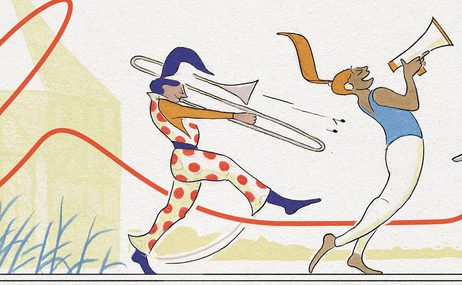Content Warning: This post contains references to child neglect and mental health challenges
In 2020, Snape Maltings hosted the MARCH Singing and Mental Health Sandpit event which included presentations, workshops and facilitated discussions between professionals working in academic, arts and health contexts. Mary Ryan, an attendee of the event, describes her experiences and shares how Snape Maltings has improved her relationship with singing and music.
Mary Ryan worked as a clinician until she took early retirement in 2009 on mental health grounds. Her ‘wilderness years’ were characterised by frequent hospital admissions and many interactions with urgent and emergency mental health services. Mary now uses these experiences to influence services at a strategic or operational level, with particular interests in quality improvement and co-productive ways of working.
There are two back stories behind my life-long not singing self, which perhaps chime with other not-singers in your worlds.
When I start a sentence with “My mother had the most beautiful voice …” people who have a carefree love of singing expect me to go on to describe the gift of song from my earliest memories. Although I have only recently come to understand it, I have had a lifelong passionate dislike of opera and my every inch recoils from being asked to sing. I am not alone in having a troubled childhood, but am probably relatively unusual in growing up in a dangerous home in which singing was a warning that a punishment of some sort was about to be meted out. The louder my mother sang the more painful the imminent abuse was likely to be. At best, singing meant that I was back in Coventry. Most often it meant shouting and at worst it meant violent rage. Today I hope my troubled mother would be recognised as suffering the effects of complex trauma herself, but in the 60s and 70s asking for medical help for possible mental illness would have been shameful. So, on we went, a roller-coaster life in which singing meant danger.
My Dad died soon after my fourth birthday. I started school almost immediately, it being thought better for me and my just-older brother to be out of a house filled with anguish. We lived in a tight-knit Catholic community with a village school l run by nuns. Once a week the children walked in pairs to a nearby chapel for Mass. During my first week, I was in the front pew trying to sing along with everyone else, words I could barely read and tunes I don’t suppose I had heard before. One nun stood at the end of the row listening intently. She indicated that I was to come to her, disturbing other singing children to do so. She then bent low, wagged an angry finger at me and said “Don’t you ever, ever, sing in church again.” Thereafter, the others walked in pairs, me and a nun walking behind. In church, I stood with her in absolute silence whilst others sang full-heartedly. Not only an evil child but one with a horribly distorted voice to boot.
There were times between then and now when I did sing, especially during my carefree years at university, in the bath and on my bike…but these were almost always solitary solos without much in the way of musicality. For after all, I was just one of those people who simply can’t sing. My adult wilderness years with severe depression began with an unexpected stroke in my 40s. This turned me overnight into someone who found words and articulating opinions more difficult. Simultaneously, it seemed to rob me of any musical memory. I could no longer ever hold a tune in my head.
And so, avoiding opera, never singing, unable to recognise particular pieces of music, I passed the last 20 years of my life, expecting to go to the grave like this. But that changed in an instant, about 18 months ago, when I was invited to attend a performance of a tiny singing charity called Health Pitch. The charity was founded by my now-friend Camilla who had witnessed the deep joy opera gave to her elderly mother during her dying months. Health Pitch perform exquisite pieces from familiar operas in unlikely settings, such as old people’s homes, mental health wards, hospices and schools. Their few gifted singers use few props and no accompaniment. As I sat spellbound at their performance of ‘The Audition’, something very profound happened. I was close enough to a beautiful young soprano in jeans to feel her breathing and to know that, even if my larynx couldn’t sing, my soul was singing with her, that the sung voice had the capacity to lift me from sadness to joy, as it lifted everyone else in the room too.

It was the first time I had sung anything for about 40 years and it felt amazing...Mary Ryan
So it was that I found myself at the MARCH Singing and Mental Health Sandpit event at Snape Maltings in January, representing Health Pitch. I walked there via the beautiful path from Aldeburgh to Snape, listening to the wonderful morning calls of birds across the marsh. It seemed nigh impossible that a never-singing person should be coming to a singing event at such a beautifully creative place. I knew I would be among people who could sing extremely well, in a tribe I thought I could never belong to.
I owe the team who co-ordinated and contributed to that special day a huge thanks, not only for its inspiring content, but also for helping me discover that I do have a voice. Surprisingly, I didn’t want to mime in shared singing sessions. Surrounded by those used to working with all sorts of citizens, from the gifted to the frightened, the imprisoned to the deeply sad, I could not resist the exhilaration of doing my best to find rusty notes, copy rhythms, follow hands. It was the first time I had sung anything for about 40 years and it felt amazing.
I left Snape for the trains back to Devon determined to do more. Yes, I will go to an opera this year. Yes, I will go back to Snape Maltings as an ordinary guest to steep myself in the creative magic of the place and Yes, I will find someone to help me sing more. I had discovered at Snape Maltings that singing yourself nurtures the soul in a way that is different to hearing someone else sing, however beautifully. And thus, we get to Marion, a singing teacher who is passionate about helping those convinced that they can’t sing. I have had my second lesson. I have done my practice with passion and energy. I have made lots of odd sounds, my voice discovering a range beyond the spoken, through squeaks, booms and whoops. And yesterday, I sang just on my own, the first few words of Amazing Grace. And we both cried.
Thank you, Snape Maltings.
Read more

Impacts of singing on health and wellbeing
Series: Creative Thinktanks Ideas explored: music for health and wellbeing
Music and Wellbeing in Early Childhood
Series: Creative Thinktanks Ideas explored: music for health and wellbeing
Young Musicians' Health & Wellbeing
We brought together some great minds to discuss the health and wellbeing of young musicians, in our latest Britten Pears Arts Think Tank. The…
